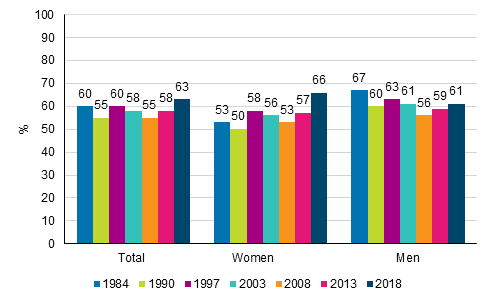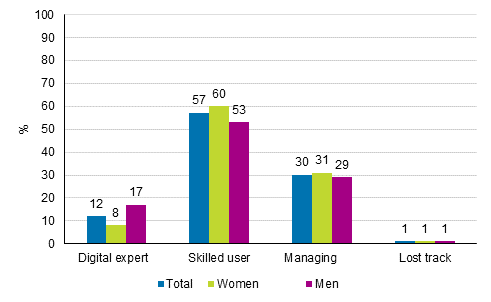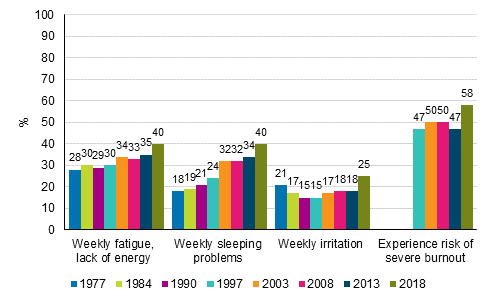News 12 Dec 2019
Working life in the digital age: enthusiasm, social support - and coping problems
The importance of work has increased for Finnish wage and salary earners but, at the same time, time pressure and coping problems have also increased. Both characteristics are emphasised in women’s work. Digitalisation has rapidly penetrated Finnish working life. Its effects, however, vary in different wage and salary earner groups. Statistics Finland’s eighth Quality of Work Life Survey for 2018 shows that working life has developed in a highly positive direction in many respects but, at the same time, the development also shows some very concerning features.
In 2018, wage and salary earners valued gainful employment more than ever before in the history of the Quality of Work Life Survey. The subject was first studied already in 1984. Men have conventionally considered gainful employment a highly important area of life, more often so than women, but in 2018 already 66 per cent of women considered gainful employment highly important, while 61 per cent of men thought so.
Gainful employment a highly important part of life, share of wage and salary earners
Quality of Work Life Surveys 1984.1990, 1997, 2003, 2008, 2013 and 2018

The share of wage and salary earners that are enthusiastic about their work, that feel satisfied when immersed in their work and that feel their work is highly important and significant has increased clearly since 2013. Women felt all of this more commonly than men.
Other positive developments visible in working life are, e.g. that the work atmosphere has improved, social support has increased, satisfaction with supervisory work and family-friendliness at workplaces has grown. Issues are discussed more openly in workplaces. Teamwork and satisfaction with teamwork have also increased.
More wage and salary earners than before feel that gender equality has been very well accomplished at their workplace. The work experience of ageing wage and salary earners is also appreciated more and employees with ethnic background are treated more equally than before.
Digitalisation has penetrated working life
Already 90 per cent of wage and salary earners use various digital applications or devices in their work. The effects of digitalisation are most visible in the work of upper-level employees, where the change has increased the efficiency, tempo, creativity and transparency of the work, as well as the burdening of work more than for other wage and salary earner groups.
Women experience the effects of digitalisation as an increase in the burdening and tempo of work more often than men, while men emphasise the increase in efficiency and creativity of the work more than women. Digitalisation has increased the supervision related to work most among lower-level employees of whom one in two feel this way.
Upper-level salaried employees consider their digital skills to be better than others. Of all wage and salary earners that use digital tools, 12 per cent considered themselves to be digital experts, 57 per cent skilled users and 30 per cent felt that they were managing with digitalisation. One per cent felt that they had already lost track when it comes to digitalisation. Among upper-level salaried employees, 77 per cent defined themselves as experts or skilled, while the corresponding share for lower-level employees was 71 per cent and 57 per cent for workers.
Assessment of one’s digital skills at work, share of wage and salary earners
Quality of Work Life Survey 2018

Around 70 per cent of wage and salary earners that use real-time messaging tools and applications that enable remote meetings felt that digitalisation had increased fluency of information flow in general, but one-third felt that it also had increased misunderstandings in communication. Good 40 per cent felt that face-to-face communication had decreased.
Around one in ten wage and salary earners working in customer work had also experienced change in customer work that used to be carried out face-to-face had, at least in part, been replaced with virtual remote access. A majority (80%) saw positive features in this change but around one-third felt that it was partly or fully negative.
Time pressure and coping problems have increased
The most worrying development in the Quality of Work Life Survey 2018 is visible as an increase in harmful time pressure and coping problems from 2013especially among women. The feeling that time pressure causes a lot or quite a lot of harmful strain at work has increased for women (women 39%, men 26%) and is higher than ever in the 41 year history of the Quality of Work Life Survey. Time pressure has reached record levels in particular in the municipal sector (women 47%, men 28%) and it is most harmful in the work of lower-level employees.
The share of wage and salary earners experiencing sleeping problems at least once a week has increased clearly in five years, as has the share of those who feel tense, nervous or irritable. More than one-half of wage and salary earners felt that severe burnout is a clear risk or at least thought so every now and then in 2018. The share had increased in five years from 52 to 65 per cent for women and from 42 to 51 per cent for men.
One in four wage and salary earners also had difficulty in concentrating and remembering things at least once a week. These concentration and memory problems were clearly more common for women than for men, and they were commonest among those aged 25 to 34 and 35 to 44.
It is especially alarming that different symptoms have increased among young wage and salary earners and those in early middle age. For example, neck, shoulder and back pain that previously used to plague ageing wage and salary earners in particular are now almost as common in younger age groups of wage and salary earners as among those aged over 55. Fatigue and feelings of lack of energy has increased especially among those aged 35 to 44 and in younger age groups.
Share of wage and salary earners experiencing various symptoms weekly and those who see burnout as a risk
Quality of Work Life Surveys 1977, 1984, 1990, 1997, 2003, 2008, 2013 and 2018

All in all, it seems that Finnish working life is now changing faster than ever.
“A lot of positive development can be seen in conventional areas of working life development: supervisory work has improved clearly, huge progress is visible in equality and the diversity of workplaces, and workplaces are more positive towards various family leaves both for fathers and mothers,” says Senior Researcher Hanna Sutela.
“It also seems that interaction at workplaces has improved, social support has increased, and prevalence of conflicts has decreased,” says Senior Researcher Anna Pärnänen.
Digitalisation that has penetrated working life has increased efficiency of work but, at the same time, also its tempo and time pressure. Fragmentation of work is also very familiar for many wage and salary earners.
“Various physical symptoms and problems with coping becoming more common especially among women, young wage and salary earners and those in early middle age is worrying. The results should be taken seriously in terms of mental occupational health and development measures for working life,” Sutela and Pärnänen point out.
Further information:
Senior Researcher Hanna Sutela tel. +358 29 551 2907, Senior Researcher Anna Pärnänen tel. +358 29 551 3795, Senior Statistician Marianne Keyriläinen tel. +358 29 551 3656
Read the publication: Working life in the digital age – results of the Quality of work life surveys 1977 to 2018 (PDF) (in Finnish)
Statistics on quality of work life
